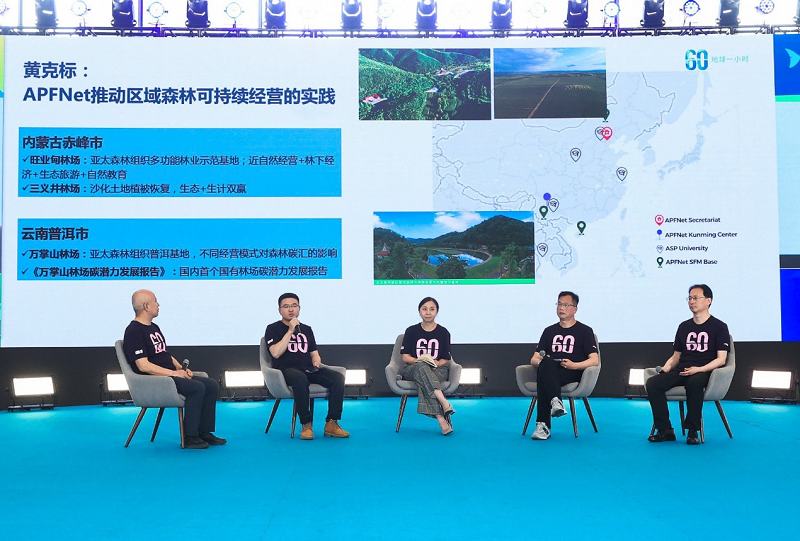On March 22, the "Earth Hour 2025" in China was successfully held in Hengqin, Zhuhai. APFNet was invited to participate, sharing its insights on promoting regional forest restoration and sustainable management practices during a session themed "The Rewards of Green Hills and Clear Waters: Forest Ecosystem Services."

Themed Salon "The Rewards of Green Waters and Lush Mountains: Forest Ecosystem Services" (Photo/WWF China)
At the session, APFNet highlighted its demonstration projects in Inner Mongolia and Yunnan, China. In Inner Mongolia, APFNet has implemented multifunctional forest projects at the Wangyedian Forest Farm, focusing on close-to-nature forest management to improve forest quality, enhance the stability and biodiversity of natural forests through assisted natural regeneration, and leverage the socioeconomic benefits of forest ecosystems by developing non-timber forest products (NTFPs) and promoting eco-tourism. At the southern edge of the Horqin Sandy Land, APFNet supported the Sanyijing Forest Farm in a vegetation restoration project on desertified land, advancing practices in combating desertification, effectively improving the local ecological environment, and providing sustainable livelihood support to local communities through projects that integrate native tree species with economic tree species. In Yunnan, at the APFNet Pu'er Base, in addition to promoting sustainable forest management activities, APFNet conducted research and analysis on forest carbon sequestration capabilities under different management models at the Wanzhangshan Forest Farm and released China's first carbon potential development report for a state-owned forest farm.

APFNet representative shares insights at the salon(photo/WWF China)
Coinciding with "Lancang-Mekong Cooperation (LMC) Week," APFNet highlighted its practices in the Lancang-Mekong region, a priority area for the organization. Since its inception, APFNet has actively addressed the forestry development needs of members in the Lancang-Mekong region, emphasizing transboundary ecological protection. Key projects involve assisting members of the Lancang-Mekong region in implementing comprehensive forest ecosystem management initiatives and supporting Cambodia in establishing a breeding center for tropical precious tree species to promote forest ecosystem and biodiversity conservation in the region. Additionally, APFNet promotes multi-level cooperation and exchange through initiatives such as the Sino–ASEAN Network of Forestry Research Institutes (SANFRI), the Presidents Forum of Forestry Universities, and the Forestry Student Summer Camp in the region. Currently, APFNet is collaborating with regional partners to advance forest fire management, aiming to reduce fire risks and enhance ecological security through transboundary collaboration.
Earth Hour, initiated by the World Wildlife Fund (WWF) in 2007, calls on governments, businesses, and individuals worldwide to voluntarily turn off their lights for one hour on the last Saturday evening of March each year. This initiative aims to advocate and promote energy saving and emission reduction in response to global climate change.



